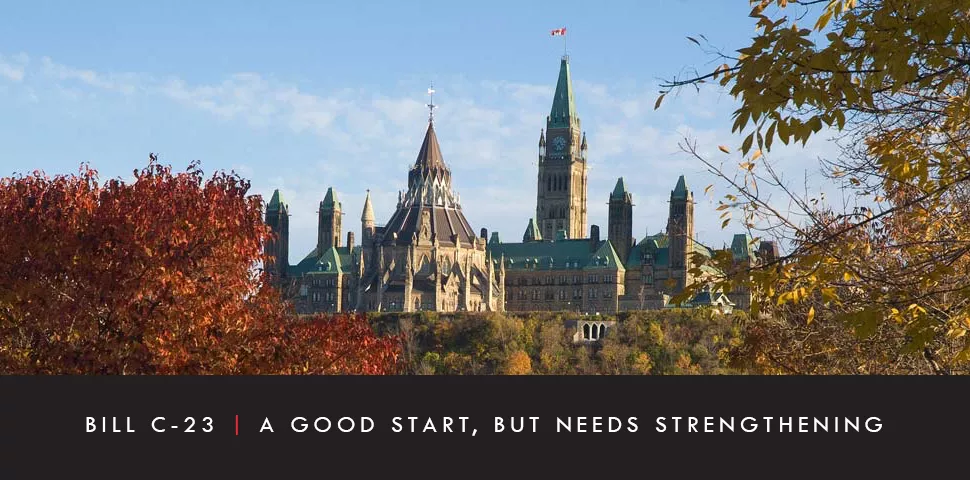BILL C-23: A GOOD START, BUT NEEDS STRENGTHENING
HERITAGE OTTAWA
After years of advocating for federal legislation to protect Canada's designated heritage places, Heritage Ottawa eagerly welcomed the first reading on June 7, 2022 of Bill C-23: An Act respecting places, persons and events of national historic significance or national interest, archaeological resources and cultural and natural heritage called the Historic Places of Canada Act. The federal Minister of Environment and Climate Change will be responsible for the Act and Parks Canada Agency will administer it.
Heritage Ottawa wrote to all MPs in the national capital region asking for their support of Bill C-23 with our proposed amendments. Second Reading of the Bill began on December 2, 2022. Comments and questions came from all parties, and all supported a need for the legislation with some MPs noting it was a good "first step" in protecting historic sites.
update
Unfortunately, the plan to continue Second Reading when Parliament returned on March 9 was disrupted by other legislation before the House meaning Bill C-23 never returned for debate before the summer adjournment of the House of Commons on June 22. The House reconvened on September 18 and the Bill has yet to be brought back to committee for Second Reading. CONTACT YOUR MP and ask when Bill C-23 will return for Second Reading.
As well as our own submission, Heritage Ottawa participated in a nation-wide Bill C-23 Working Group made up of organizations and individuals from across the country. The group was the recipient of the National Trust for Canada's 2023 Governor's Award at a ceremony in Ottawa on October 21, 2023.
Bill C-23
An important first step
Canada is the only G-7 country without legislation to protect its federally designated heritage places. This fact leaves hundreds of places of cultural heritage value without legal protection. And that includes Canada's Parliament Buildings. READ the excellent summary about this important new legislation by Leslie Maitland.
The draft bill is an important first step and Heritage Ottawa was pleased to see that it addresses recommendations of the Truth and Reconciliation Report with concrete actions to support recognition of the history and culture of Indigenous, Inuit and Métis peoples.
Toothless Legislation?
Other protective measures in the draft bill, however, need strengthening if the legislation is to be truly effective. Heritage Ottawa recommends that the government consider the following changes and additions to the draft bill:
Retain the nomenclature National Historic Site of Canada. Do not dilute the importance and credibility of this designation for the sake of bureaucratic streamlining. The term has great meaning not just for federally-owned properties, but for the nearly 1,000 NHSC owned by others.
Designations should explicitly include settings and landscapes of heritage places to ensure interventions consider impact on the entire place, not just building footprints, for example;
Accountability: include a mechanism for reporting on the state of federally-owned heritage properties as recommended by the Auditor General, such as a tabled Annual Report. The intent is to keep heritage places on the radar and prevent demolition by neglect (Example 24 Sussex Drive).
Dispute Mechanism: where departments that own federally designated heritage assets disagree with Parks Canada Agency on appropriate heritage conservation measures, an independent third party (such as the Historic Sites and Monuments Board of Canada) could be empowered to mediate;
Disposal: from time to time, the federal government disposes of heritage designated properties; the continued protection of these properties should be ensured under new ownership with the implementation of such measures as conservation easements;
Coverage: the draft bill only applies to heritage designated properties owned by federal departments; to strengthen its effectiveness the bill should apply to all heritage places under federal control, as is the case with the Accessible Canada Act. It is not reasonable to exclude the National Museums, federal post offices, the Bank of Canada, the National Arts Centre, and other significant heritage places owned by Crown Corporations across Canada; and
Provision of implementing Regulations.
These practical measures would serve to make Bill C-23 a more robust effective piece of legislation.
Heritage Ottawa has submitted our concerns on the draft legislation to the Minister of Environment and Climate Change, the Honourable Steven Guilbeault, and will apply to make a presentation to the Standing Committee on the Environment and Sustainable Development (ENVI) when able. Stay tuned.
Related Reading:
Bill C-23 Working Group's submission to the Minister of Environment and Climate Change
Draft Federal Legislation to Protect Historic Places (Bill C-23) | Leslie Maitland
Federal MP John Aldag's address in the Statements By Members session in the House of Commons, acknowledging Bill C-23 and Heritage Week (Video, 1 minute 10 sec)):
